
Ten Commandments The Ten Commandments are a vital part of our nation's heritage
Sabbath or Sunday is not about the
“Law” being done away with, as Luke says “That doesn’t mean
the Law has lost its force, in even the smallest point. It is
stronger and more permanent than heaven and earth” Luke
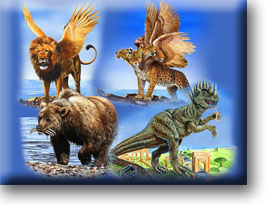
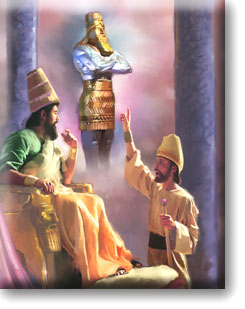
So we can see from scripture three strong warnings

Antiochene tendencies have
been characterized as Aristotelian (concerned with what is
before them); Semitic (emphasizing the oneness of God); and
historical (focusing on the incarnation of Christ). Understanding
the meanings and origins of the words in the scriptures
was important to exegesis of texts. Operation was,
for these thinkers, the way to distinguish the persons of the
Trinity.
Antiochenes tended to place much emphasis on the
humanity of Christ and saw a great need for human moral
effort.
Alexandrian
teachings moved toward speculation, philosophical
discourse, and an allegorical interpretation of the Bible,
Clement of Alexandria (c 150 - c 230
CE) (born Titus Flavius Clemens) united philosophy and theology by
using ideas from Greek philosophy (primarily Plato) to elucidate
truths within Christian doctrine
The Church fathers at the
Council of Laodicea were not opposed to Sunday services but
were opposed to Christians Judaizing the Sabbath (see 29th
Canon), Judaizing is what they labeled Christians resting on
the Sabbath day. At the Council of
Sunday was the first day of the week according
to the Jewish method of reckoning, but for Christians it began to take the
place of the Jewish Sabbath in
Apostolic times as the day set apart for the public and solemn
worship of God. The practice of meeting together on the first
day of the week for the celebration of the Eucharistic
Sacrifice is indicated in Acts, xx 7; I Cor., xvi, 2; in
Apoc., i, 10, it is called the Lord's day. In the Didache
(xiv) the injunction is given: "On the Lord's Day come
together and break bread Catholic Encyclopedia .
5th-century church
historians, Socrates Scholasticus and Sozomen:
"For although almost all
churches throughout the world celebrate the sacred mysteries
[the Lord's Supper] on the sabbath [Saturday] of every week,
yet the Christians of Alexandria and at
"The people of
Constantine
Growing
distinction from the Sabbath In the light
of these texts, the celebration of the day of the Resurrection
acquired a doctrinal and symbolic value capable of expressing
the entire Christian mystery in all its newness.
It
was this newness which the catechesis of the first
centuries stressed as it sought to show the prominence
of Sunday relative to the
Jewish
Sabbath.
In
effect, Sunday is the day above all other days which summons
Christians to remember the salvation which was given to them in
baptism and which has made them new in Christ.
On Keeping
the Lord's Day Holy (Dies Domini) John Paul II (Vatican Web Site,
July 7, 1998)
Sunday is a day which is at the very heart of the Christian life. From the beginning of my Pontificate, I have not ceased to repeat: "Do not be afraid! Open, open wide the doors to Christ!".(9) In the same way, today I would strongly urge everyone to rediscover Sunday:
This
Christocentric vision sheds light upon another symbolism which
Christian reflection and pastoral practice ascribed to the
Lord's Day. Wise
pastoral intuition suggested to the Church the
christianization of the notion of Sunday as "the day of
the sun", which
was the Roman name for the day and which is retained in some
modern languages.(29) This was in order to draw the faithful
away from the seduction of cults which worshiped the sun, and
to direct the celebration of the day to Christ, humanity's
true "sun". Writing to the pagans, Saint Justin uses the language
of the time to note that Christians gather together "on the
day named after the sun",(30) but for believers the expression
had already assumed a new meaning which was unmistakably
rooted in the Gospel.
On Keeping the Lord's Day Holy
(Dies Domini) John Paul
II (Vatican Web Site, July 7, 1998)
Catechism 2190
The sabbath, which represented the completion of the first
creation, has been replaced by Sunday which recalls the new
creation inaugurated by the Resurrection of Christ. English Translation of the Cathechism of
the Catholic Church for the
It is
the duty of Christians therefore to remember that, although
the practices of the Jewish Sabbath are gone, surpassed as
they are by the "fulfillment" which Sunday brings, the
underlying reasons for keeping "the Lord's Day" holy —
inscribed solemnly in the
Ten Commandments — remain valid, though they need to be
reinterpreted in the light of the theology and
spirituality of Sunday:
On Keeping the Lord's Day Holy (Dies
Domini) John Paul II (Vatican Web Site, July 7, 1998)
As time has
moved on people have accepted the Sabbath change and have lost
sight or are unaware of the background of this issue. There was a
time when Protestants and Catholics where very antagonistic to
each other, I’m not suggesting that was a good
thing or that we should go back to those days, the point is that
the Catholic Church had proudly stated they were responsible for
the change, note these two comments.
1. The Catechism Simply Explained by Canon Cafferata, (first published in 1897)
Regarding the
change to Sunday. “the apostles made no law on the matter, and
the full transfer from
Saturday to Sunday was a gradual process under the authority
of the church. Those Christians who believe in the
bible and the bible only must have some difficulty in explaining
why they keep Sunday holy and not the Sabbath”
The history was accurately summarized a century
ago by Chief Justice Terry of the Supreme Court of California in
Ex parte Newman, 9 Cal. 502, 509:
The truth is, however much it may
be disguised, that this
one day of rest ( Sunday) is a purely religious idea. Derived from
the Sabbatical institutions of the ancient
Hebrew, it has been adopted into all the
creeds of succeeding religious sects throughout the civilized
world; and whether it be the Friday of the Mohammedan, the
Saturday of the Israelite, or the Sunday of the Christian, it
is alike fixed in the affections of its followers,
beyond the power
of eradication, and in most of the States of our
Confederacy, the aid of the law to enforce its
observance has been given under the pretence of a
civil, municipal, or police regulation.
Page 366
Sunday laws has always been a mixed bag. Some
judges
have
asserted
that
the statutes have a "purely" civil aim, i. e., limitation of
work time and provision for a common and universal leisure.
But other judges have
recognized the religious significance of Sunday and that
the laws existed to enforce the maintenance of that
significance.
"Our Puritan ancestors intended that the day
should be not merely a day of rest from labor, but also a day
devoted to public and private worship and to religious meditation
and repose, undisturbed by secular cares or amusements. They saw fit to enforce the
observance of the day by penal legislation, and the statute
regulations which they devised for that purpose have
continued in force, without any substantial modification, to
the present time."
The Maryland court, in sustaining the
challenged law in No. 8, relied on Judefind v. State,
78 Md. 510, 28 A. 405, and Levering v. Park
Commissioner,5 134 Md. 48, 106 A. 176.
In the former the court said:
It is undoubtedly true that rest
from secular employment on Sunday does have a tendency to
foster and encourage the Christian religion - of all sects and
denominations that observe that day - as rest from work and
ordinary occupation enables many to engage in public worship
who probably would not otherwise do so. But it would scarcely
be asked of a Court, in what professes to be a Christian land,
to declare a law unconstitutional because it requires rest
from bodily labor on Sunday, (except works of necessity and
charity,) and thereby promotes the cause
of Christianity. If
the Christian religion is, incidentally or otherwise,
benefited or fostered by having this day of rest, as it
undoubtedly is, there is all the more reason for the
enforcement of laws that help to preserve it."
78

Ten Commandments
The Ten Commandments are a vital part of our nation's
heritage
Situation
The Ten Commandments have been the foundation upon which much
of
Context That is why the Alliance Defense
Fund is actively involved in funding and litigating cases in
defense of the public display of the Ten Commandments – so that
our nation’s system of laws and freedoms will preserved for
generations to come. (Click Here )
• This speech in particular
suggests the sense of "peculiar mission" for
•
Toward the end of
his oration, Webster declares, We are bound to maintain
public liberty, and, by example of our own systems,
• to
convince the world that order and law,
religion and morality, the rights of
conscience, the rights of persons, the
rights of property, may all be preserved
and secured, in the most perfect manner,
by a government purely elective. If we
fail in this, our disaster will
be signal
(Webster, 112).
•
Because the Pilgrims (along with the
1607 establishment of Jamestown) are a fact of U.S.
beginnings, and because World War I had recently
emphasized the undeniable role of the United States not
only as a political world power, but as one which has
"affected the entire course of western civilization, and
largely helped to determine its fate, which,
shaken and clouded by the most desolating of wars, is now
trembling in the balance"; because of this, Lodge says, the
Pilgrims "clearly" represent a decisive event

Rev13:12 He (Lamb like Beast) (America) exercised all the authority of the first beast (Papal Roman). And he required all the earth and its people to worship the first beast, whose fatal wound had been healed

The Pope had "taken possession" of
his 
•
American non-Catholics
last week seemed almost as happy as Catholics to have the Pope
in their midst. No old sectarian angers darkened the pageant.
Whatever doctrinal reservations may remain about the Pope of
Rome lay quiet, at least for the moment.
•
The spectacle was a startling confirmation
of the substantial changes that have occurred in American
attitudes toward the Roman Catholic Church and the papacy.
One has only to imagine the nation's furious reception if
Pope Pius XII had appeared in

with the Ten Commandments and Sunday as a common bond
linked with:
Pentecostalism and a resurgent Christian movement in the
The Reformation is over watch this
video from 2015 (Click)
Pope speaks to the United States
Congress 2016 (Click)
Pope
Benedict XVI has called for the formation of a “true
world political
authority.
Ecumenical
in
scope
and decidedly worldly in practice the three so-called "waves of
the Holy Spirit" (Pentecostals, Charismatics and Power Evangelism
teachers) have now blended into
a powerful coalition which is rapidly spreading. This poses a great threat
to the purity of the Church and the Gospel.
(Pentecostalism
Charismatic)
The
Rise of the Religious Right in the Republican
Party
click
here a
public information project of the Center for
Religion,Ethics, and Social Policy, at
• "Our job is to reclaim
 Project Jeremiah
Meanwhile, judges and others, who handle the law, do not know the
Biblical and historical connection between God and law. And civil
servants no longer consider themselves “ministers of God…for
good…to execute wrath upon him that doeth evil" (Romans 13). In a
day when “great men” have altogether “broken the yoke and burst
the bonds"
Project Jeremiah
Meanwhile, judges and others, who handle the law, do not know the
Biblical and historical connection between God and law. And civil
servants no longer consider themselves “ministers of God…for
good…to execute wrath upon him that doeth evil" (Romans 13). In a
day when “great men” have altogether “broken the yoke and burst
the bonds"
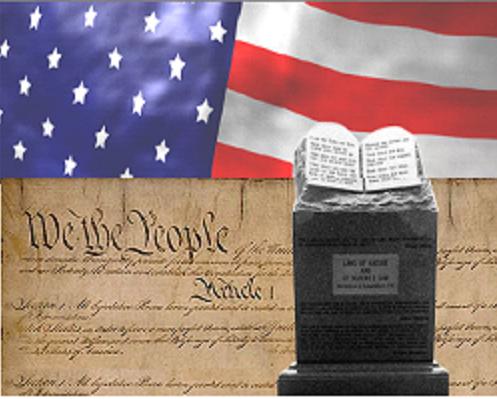 the former
the former 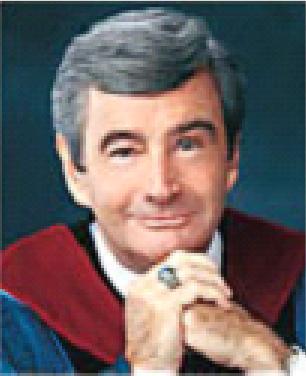
•
Dominionism is a form of Social Darwinism.
 Joel's
Army is prophesied to become an Armageddon-ready military
force of young people with a divine
mandate to physically impose Christian "dominion" on
non-believers.
Joel's
Army is prophesied to become an Armageddon-ready military
force of young people with a divine
mandate to physically impose Christian "dominion" on
non-believers.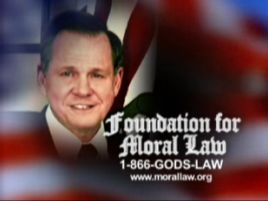 We believe that the Ten Commandments are
given by God and describe duties we owe to Him and to each
other. They are the basis of our virtue and morality.
We believe that the Ten Commandments are
given by God and describe duties we owe to Him and to each
other. They are the basis of our virtue and morality.
We believe that the United
States of America was founded on the laws of Nature and
Nature's God, and that Almighty God is sovereign over the
affairs of men, exercising jurisdiction over the family,
church, state, and each individual.(amongest other statements)
Check out this link to Theocracy Watch (click here for link)
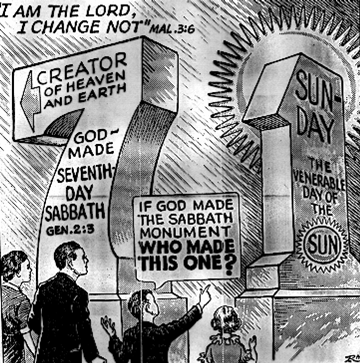
Rev
13:14 He ordered the people to make a
great statue of the first beast, who was fatally wounded
and then came back to life. 15 He was then
permitted to give life to this statue ( Sunday Worship) so that it could speak. Then the
statue of the beast commanded that anyone refusing to
worship it must die
The claim has always been made that The Sabbath was for the Jews, this idea ignores the clear word of scripture :-